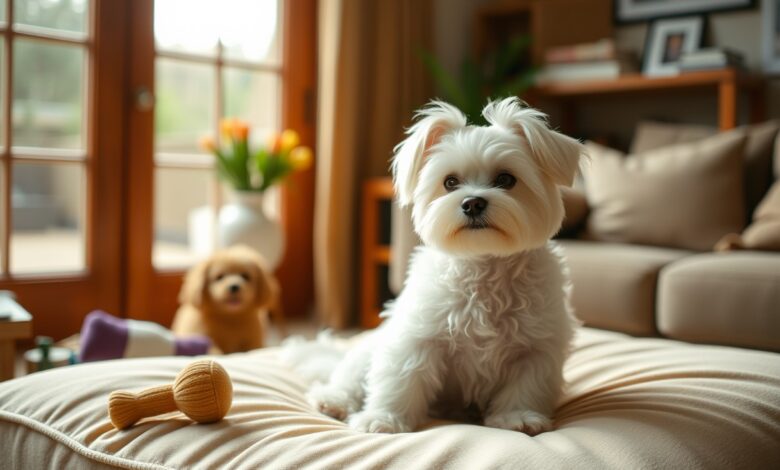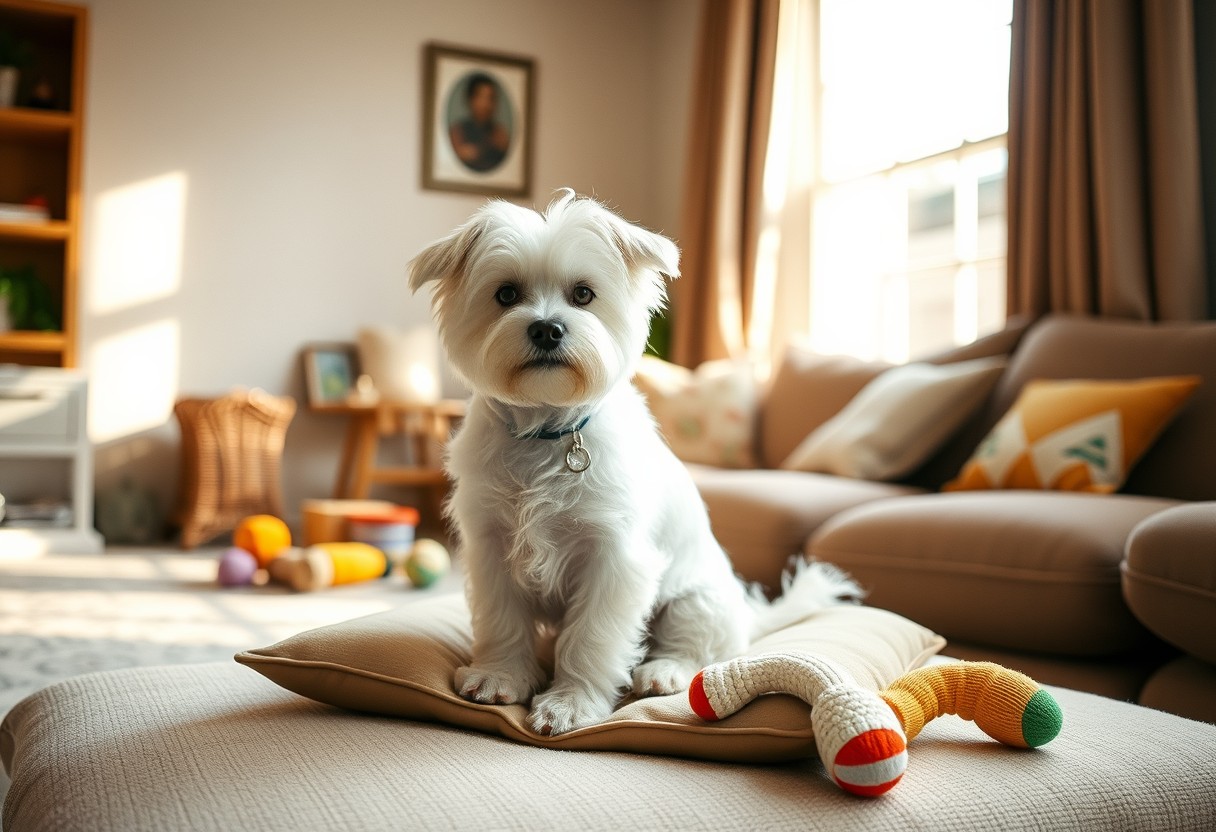Are Maltese Calm Dogs? Temperament and Behavior

Maltese dogs are renowned for their charming, affectionate nature, making them wonderful companions for many pet owners. However, you may wonder if their temperament leans towards being calm. Understanding the behavior and temperament of Maltese dogs can help you determine if they fit well with your lifestyle and family dynamics. In this post, you will gain insights into their playful yet sensitive disposition and learn how to foster a balanced environment for your furry friend.
Key Takeaways:
- Temperament: Maltese dogs are known for their friendly and affectionate nature, making them great companions.
- Energy Levels: While they have a playful side, Maltese dogs can be surprisingly calm, enjoying relaxation time with their owners.
- Social Behavior: They typically get along well with other pets and children, exhibiting a sociable and gentle demeanor.
Understanding Maltese Temperament
A Maltese is known for its affectionate and lively personality. Their temperament often reflects a blend of playfulness and warmth, making them excellent companions for families and individuals alike. You can expect a Maltese to form strong bonds with you, as they thrive on human interaction and love to be the center of attention. Though they are small in size, their hearts are undoubtedly large, exhibiting loyalty and spirited engagement with their loved ones.
General Traits
Traits that define the Maltese include their affectionate nature, intelligence, and a tendency to be protective of their families. These dogs are known for their cheerful demeanor and a natural curiosity that keeps them engaged in their surroundings. You will find that they are also quite social, enjoying playtime and interaction with other pets and people, making them a delightful addition to your home.
Energy Levels
Any Maltese has a high energy level that requires regular exercise and mental stimulation. You should expect to engage your furry friend in daily activities, such as walks or play sessions, to keep them happy and healthy. Neglecting their need for activity may result in excessive barking or destructive behavior, as they possess a curious and spirited nature.
Maltese dogs are generally energetic, requiring about 30 minutes to an hour of exercise each day. This can include walks, playtime, or interactive games to keep their active minds engaged. They thrive in environments where you can provide them with regular stimulation to prevent boredom. You should also keep in mind that their small stature means their energy might manifest through bursts of activity, followed by moments of rest. Balancing their exercise routine is vital to maintaining a calm and content Maltese.
Social Behavior
There’s no denying that Maltese dogs possess a vibrant social behavior. These dogs thrive on companionship and interaction, making them wonderful family pets. They enjoy being the center of attention, easily bonding with their human family members, which enhances their affectionate disposition and loyalty. Understanding their social nature is key to providing a fulfilling environment for your Maltese.
Interactions with Humans
Any Maltese is likely to engage warmly with humans, often showcasing their affectionate side. They are known for their playful demeanor and can be quite entertaining. Their small size allows them to easily integrate into various activities within your home, seeking out affection and attention from everyone they encounter.
Relations with Other Pets
Pets in a Maltese’s life can often play a significant role in their overall happiness and well-being. These dogs typically demonstrate a friendly disposition towards other pets, especially when properly socialized from a young age. They are usually non-aggressive and tend to get along well with both cats and dogs, creating a harmonious home environment.
Plus, it’s crucial to introduce your Maltese to other pets gradually to foster positive relations. Keep in mind that while they’re generally sociable, their small size makes them vulnerable to larger or more dominant pets. Ensure that your Maltese feels safe and secure in their interactions. Pay attention to their body language, as they may need extra reassurance. Always supervise early interactions to help them develop trust and familiarity with their fellow pets, promoting a peaceful cohabitation.
Training and Obedience
To properly train your Maltese, consistency and positive reinforcement are key. These small dogs are intelligent and eager to please, making them receptive to basic commands and obedience training. Remember to keep training sessions short and engaging to maintain their interest, and utilize treats or praise as motivation. With effective training practices, you can shape your Maltese into a well-mannered companion.
Ease of Training
Training your Maltese can be a rewarding experience. They are generally quick learners and respond well to positive reinforcement techniques. This breed enjoys bonding time with you and thrives in environments that encourage social interaction and stimulation. Keeping lessons fun and high-energy will help ensure that your Maltese remains engaged and eager to learn.
Common Challenges
On the flip side, some challenges may arise during training your Maltese. They can exhibit stubbornness at times, which may hinder their responsiveness to commands. Additionally, their small size might lead you to overlook necessary discipline, potentially resulting in bad behavior. It’s important to be firm yet gentle, as overwhelming your pet can deter their progress.
The most common challenges you might face include their stubbornness, which can make them resistant at times, and potential overlooked discipline due to their small stature. This might lead to issues such as excessive barking or poor socialization skills. To combat these challenges, ensure that you adopt a firm but gentle training approach while remaining consistent. Building a strong bond through training and socialization will help foster a well-adjusted Maltese, making the process both effective and enjoyable for you both.
Calming Techniques
Keep in mind that every Maltese is unique, and finding the right calming techniques for your dog may take some time. Techniques such as positive reinforcement, structured routines, and engaging play can help reduce anxiety and promote a sense of calm. Consistency and patience in your approach will yield the best results for keeping your Maltese happy and relaxed.
Exercise and Play
For your Maltese to remain calm, engaging them in regular exercise and play is important. Short walks and interactive games not only provide physical stimulation but also mental engagement, which can significantly reduce hyperactivity and stress. Aim for daily activities tailored to your dog’s energy level to cultivate a sense of balance.
Environmental Considerations
Techniques for creating a calming environment for your Maltese include minimizing noise, providing a cozy space, and managing their social interactions. It’s important to observe your dog’s reactions to their environment; a chaotic atmosphere may increase anxiety levels. Keep in mind that too little stimulation can lead to boredom, while too much chaos can overwhelm your dog. Identifying these triggers and making small adjustments can create a more calming and supportive space for your Maltese, ultimately helping them to thrive.
Calming your Maltese involves understanding their specific needs and responding to their behavior. By creating a safe space free from excessive noise, you can help alleviate stress. Introducing scents such as lavender through diffusers or calming sprays can also create a positive atmosphere. Additionally, avoiding rapid changes to their environment and maintaining a consistent daily routine fosters a sense of security. Remember that socialization matters too—exposing your Maltese to different people and pets at a controlled pace will contribute to their overall sense of calm.

Grooming and Care
Your Maltese requires regular grooming to maintain their beautiful coat and overall health. Daily brushing is imperative to prevent tangles and matting, while regular baths will keep their fur clean and soft. Additionally, don’t forget to check their ears, teeth, and nails as part of their grooming routine. By providing proper care, you can help your Maltese thrive and feel comfortable in their skin.
Impact on Behavior
For a Maltese, grooming and care can significantly influence their temperament and behavior. Regular grooming sessions can help them become accustomed to being handled, promoting a calm and composed disposition. A well-groomed dog is typically happier and more confident, leading to better interactions with you and others.
Routine and Its Importance
On a practical level, establishing a grooming routine is crucial for your Maltese’s well-being. Consistent grooming helps them understand what to expect, reducing anxiety during grooming sessions and fostering a sense of security. It also allows you to regularly inspect their skin for any issues and maintain their hygiene, which can prevent potential health problems.
Understanding the importance of routine in grooming your Maltese goes beyond aesthetics. A structured grooming schedule not only helps keep their coat in top condition but also enhances their emotional stability. When your Maltese knows when to expect grooming, they are less likely to react negatively to being handled. This continuous, loving interaction aids in building a trusting relationship between you and your dog, thus contributing to a calmer demeanor and overall improved behavior. Engaging in this routine is a vital investment in your furry friend’s happiness and well-being.
Potential Behavioral Issues
All dogs, including Maltese, can exhibit certain behavioral issues if not properly socialized or cared for. Common problems may include separation anxiety, challenging barking habits, and fearfulness. Understanding and addressing these potential issues early on is crucial for ensuring a well-adjusted, happy Maltese. By employing the right training techniques and providing a stable environment, you can mitigate these risks and foster a positive relationship with your furry companion.
Anxiety and Stress
Anxiety in Maltese dogs can manifest through excessive barking, destructive behaviors, or clinginess. As a small breed, they may feel more vulnerable to stressors in their environment, making it crucial for you to create a calm and secure home. Regular exercise, mental stimulation, and positive reinforcement training can greatly help reduce anxiety levels in your Maltese and encourage a relaxed disposition.
Barking and Other Habits
And while all dogs bark, Maltese are particularly known for their vocal tendencies. This tendency can lead to issues with excessive barking, especially if your dog is bored or anxious. It’s important to engage your Maltese with daily playtime or training sessions to keep them mentally stimulated. Also, providing necessary boundaries with a firm and gentle approach can help curb unwanted barking. Keep in mind, intervention and training at an early stage can prevent these behaviors from becoming ingrained habits, ensuring your Maltese remains a joyful addition to your household.
Summing up
Summing up, Maltese dogs can indeed exhibit a calm demeanor, but their temperament often depends on factors such as individual personality, socialization, and training. You can foster a more relaxed temperament in your Maltese by providing consistent training, ample socialization, and regular exercise. Understanding your dog’s unique needs will help you cultivate a peaceful environment, ensuring your Maltese thrives as a gentle companion in your home.





